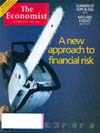
Economist, Oct. 17
(posted Saturday, Oct. 17, 1998)
The cover editorial claims that recent market volatility shouldn't cause large investors to fear risk. Such risk-aversion would provoke a recession. Instead, financial firms should keep more capital to guard against market upheaval. If firms "all start to reduce their risks simultaneously, it might trigger a vicious liquidity-draining cycle." ... A piece says cockfighting is on its last legs. The vicious sport (razors are tied to the feet of battling roosters) is still legal in four states but may soon be outlawed in two of them. ... A story mourns the end of Art Bell's radio show. Bell's national program covered "Area 51, the real messages of crop circles, the hidden third secret of Fatima, government experiments gone horribly wrong and irrefutable signs of the end of the world" and boasted 10 million loyal listeners. Bell signed off this week claiming a "threatening, terrible event" was forcing him to end his career.
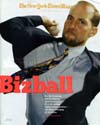
New York Times Magazine, Oct. 18
(posted Thursday, Oct. 15, 1998)
A special issue on the business of sports. A story frets that media giants' purchases of sports teams will change the way games are played. Who'll stop Fox (owner of the Los Angeles Dodgers), Disney (Anaheim Angels), and Time Warner (Atlanta Braves) from forcing star athletes to play when it will boost ratings on their own networks or from altering rules to make sports more TV friendly? ... Several stories explore fan loyalty. In one, Baltimore Orioles fans sound off to the O's owner, demanding cheaper tickets and more dedicated players (the owner is noncommittal). In another, a New York Knicks fan complains that her courtside seats have shot up in price even as the team declines. ... Other stories profile a superagent winning mammoth contracts for his baseball player clients, a rookie quarterback learning how to play the endorsements game, and NBA Commissioner David Stern, who micromanages the league's image, coordinating everything from media coverage to promotional "sock giveaways."
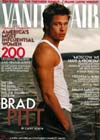
Vanity Fair, November 1998
(posted Thursday, Oct. 15, 1998)
A gripping story describes the near-tragedy aboard space station Mir when a docking module crashed and punctured Mir's walls. The Russians and American on board frantically hacked at wires and sealed off the leak, just averting death. Other lowlights of Mir life: A cosmonaut gets drenched by an antifreeze leak, which burned his skin and nauseated him; Russian mission control tells the crew to calculate the soon-to-crash module's flight path by timing it with a stopwatch. The Russians couldn't afford to buy a range finder. ... A photo essay depicts America's 200 "most influential women." Leading off: Secretary of State Madeleine Albright. From the world of magazines: Tina Brown, former editor of The New Yorker, and Anna Wintour, editor of Vogue. ... Filmmaker Ken Burns promos his forthcoming Frank Lloyd Wright documentary by profiling the architect. The piece worships Wright's genius and scolds him for dastardly treatment of his family, but those who know Wright's story will learn little new.
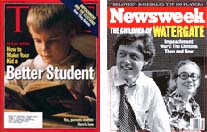
Time and Newsweek, Oct. 19
(posted Tuesday, Oct. 13, 1998)
Time's education cover package says parents should get their kids reading at an early age, be involved in their schools, not castigate them for mistakes, let them find their own learning styles, and "praise hard work and persistence--not just outcomes." Time's package backlashes against recent articles (The New Yorker, Newsweek) suggesting that parents matter little in a child's upbringing. An accompanying piece grades the "multiple intelligences" movement. MI argues that intelligence takes seven forms: musical, logical-mathematical, linguistic, spatial, bodily, intrapersonal, and interpersonal. The theory is not backed by hard science, and MI-based curricula often seem like time wasters. ...Newsweek's cover package compares Watergate and Flytrap. A piece claims that the House Flytrap proceedings lack the solemnity of Watergate--they have "all the grandeur of Ft. Lauderdale at spring break"--and notes that the vote for the Nixon inquiry was 410-4, not the 256-178 tally for the Clinton inquiry. A second article traces Bill and Hillary Clinton's progression from there to here. Hillary worked on the impeachment case against Nixon, while Bill used Watergate as an issue in his failed 1974 congressional campaign. Now the Clintons' tactics "often seem more Nixonian than New Age."
Newsweek says physicists are studying the movement of bird flocks to improve auto traffic on freeways and pedestrian traffic at stadium events. Birds both move quickly and maintain close distance to each other: Humans do one or the other.
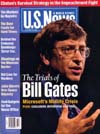
U.S. News & World Report, Oct. 19
(posted Tuesday, Oct. 13, 1998)
On the eve of the Microsoft antitrust trial, the cover story predicts the future of Bill Gates and his company. Microsoft has slowed down after an amazing 20 years, and the company now fears bloating and complacency. Gates claims, "All you have to do is slack off for one period and it's quite damaging." At the same time, a U.S. News poll shows that 73 percent of Americans have a favorable impression of Gates, and 80 percent a favorable impression of Microsoft. ... A story discovers a new weapon in the war against toxic waste. New mutant bacteria eat toxic pollution at waste dumps but are unaffected by deadly levels of radiation.
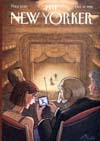
The New Yorker, Oct. 19
(posted Tuesday, Oct. 13, 1998)
A story profiles former Chilean dictator Augusto Pinochet. Pinochet is responsible for a bloody coup, the kidnapping and murder of thousands of his enemies, and Chile's remarkable economic success. Now, the aging Pinochet cannily emphasizes his work with the economy and his statesmanship. Opponents aren't buying it. ... A story weighs the value of bone marrow transplants. Transplants are the only hope of cure for some cancer patients, but the treatment itself is so unpleasant that it may not be worth it. Radiation and chemotherapy cause patients more discomfort (retching, chemically burned lips and skin, fungal infections, isolation from human contact) than the cancer itself ever would. But the payoff--for some--is recovery.
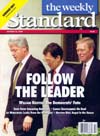
Weekly Standard, Oct. 19
(posted Tuesday, Oct. 13, 1998)
An essay argues that Congress should impeach or not impeach Clinton, but any other punishment is ridiculous. A fine is unconstitutional, and censure would weaken the presidency without weakening Clinton. "In this particular scandal, it is argued, the level of offense simply does not merit the remedy of removal. That may be right. In which case, the legislature should cease and desist and let the government go on."
--Seth Stevenson
